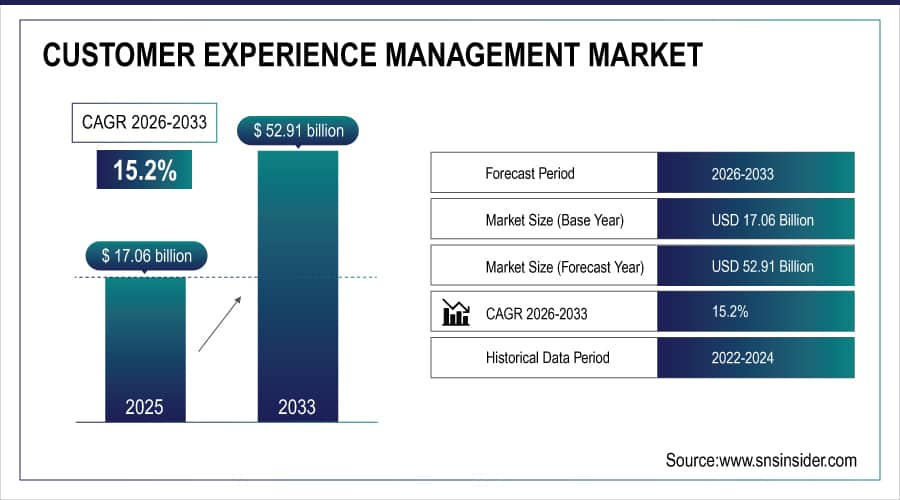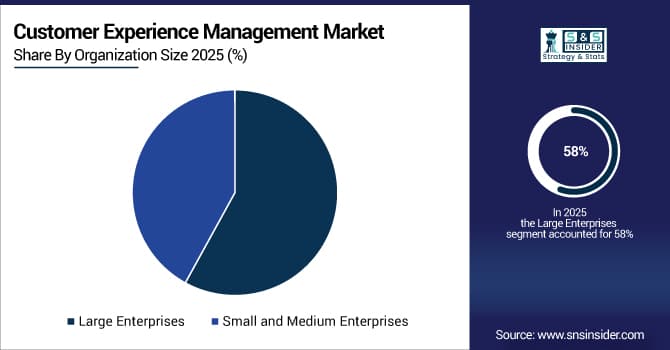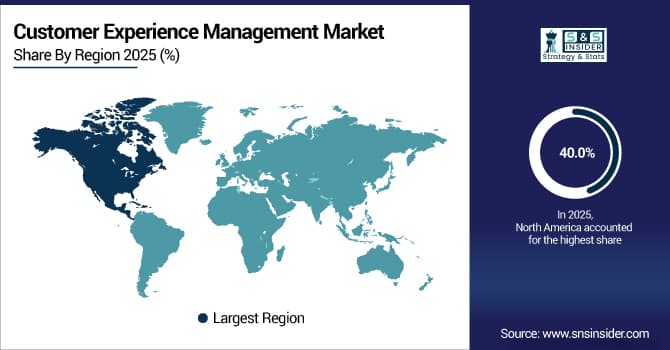Customer Experience Management Market Report Scope & Overview:
Customer Experience Management Market was valued at USD 17.06 billion in 2025E and is expected to reach USD 52.91 billion by 2033, growing at a CAGR of 15.2% from 2026-2033.
The Customer Experience Management Market is expanding due to rising digital interactions, increasing customer expectations, and the need for personalized engagement across touchpoints. Businesses are adopting AI-driven analytics, omnichannel platforms, and automation tools to improve customer satisfaction and retention. Growing use of social media, mobile apps, and real-time feedback systems enhances brand responsiveness. Additionally, enterprises are investing in cloud-based CEM solutions to optimize operations, strengthen loyalty, and gain competitive advantage, driving strong market growth.

To Get More Information On Customer Experience Management Market - Request Free Sample Report
Customer Experience Management Market Size and Forecast
-
Market Size in 2025E: USD 17.06 Billion
-
Market Size by 2033: USD 52.91 Billion
-
CAGR: 15.2% from 2026 to 2033
-
Base Year: 2025E
-
Forecast Period: 2026–2033
-
Historical Data: 2022–2024
Customer Experience Management Market Trends
-
Rising demand for personalized, seamless customer interactions is driving growth in the Customer Experience Management (CEM) market.
-
Increasing use of AI, analytics, and automation is enhancing customer insights, sentiment analysis, and journey optimization.
-
Expansion of omnichannel engagement across mobile, social, chat, voice, and in-store touchpoints is boosting adoption.
-
Growing focus on real-time feedback collection and experience orchestration is shaping investment priorities.
-
Adoption of cloud-based CEM platforms is increasing due to scalability, agility, and easier integration with enterprise systems.
-
Rising competition across retail, BFSI, telecom, and healthcare is pushing brands to improve customer retention and loyalty.
-
Partnerships between tech providers, CRM vendors, and enterprises are accelerating innovation in experience management solutions.
Customer Experience Management Market Growth Drivers:
-
Empowering Loyalty and Growth through Personalized Interactions and Advanced Technologies
Personalized interactions, data-driven insights, and seamless multichannel engagement are now fundamental for organizations aiming to foster loyalty and boom. Advanced technologies like AI, analytics, and integrated platforms enhance the effectiveness of customer experience management (CEM) strategies. Companies that align with customer wants and preferences help drive market growth by preparing meaningful, enduring relationships that result in achievement in the present dynamic business world. As customers increasingly search for personalized, seamless experiences across numerous touchpoints, the market gives extensive capability for innovation. Integrating new technology including AI, machine learning, and predictive analytics permits predictive and proactive engagement of customers.
-
Digital Transformation throughout Retail and Healthcare Sectors to Surge Demand for CEM Solutions
With the growing demand for e-commerce and digital banking, clients are increasingly willing towards digital channels. Retailers have transitioned from physical stores to digital platforms, adopting AI-enabled digital trial rooms, chatbots, and surveillance to capture and examine customer conduct. Social media shops, inclusive of those on Facebook and Instagram, simplify shopping for customers, helping stores acquire new customers and facilitate direct purchases. Consumer experience solutions are useful for retailers in reducing purchaser churn, extending client lifetime value, and retaining clients.
Customer Experience Management Market Restraints:
-
Investment Barriers and Data Security are major restraints for market growth
Smaller businesses face numerous obstacles in implementing customer experience management (CEM) solutions because of the requirement for substantial initial investments in technology infrastructure, talent acquisition, and training. Moreover, it is a significant worry to guarantee the privacy and security of data in a heavily digitalized environment. Possible data breaches have the ability to weaken customer confidence and harm the reputation of a brand, posing a significant obstacle for the CEM industry. As consumer preferences grow with technological advancements and market trends, businesses must constantly adapt to meet these dynamic expectations.
Customer Experience Management Market Segment Analysis
By Analytical Tools
Based on analytical tools, the text analytics segment dominated the market In 2025 and held a 36% share of revenue. The text analytics segment is growing with the increasing need for social media analytics and the demand for sorting customer interactions or Voice of the Customer (VoC) across various virtual touchpoints. Text analytics helps predictive analytics by imparting accurate sentiment data evaluation, and supporting users make crucial decisions related to the business by evaluating modern-day and historical statistics to forecast future outcomes.
The speech analytics segment is expected to develop with an annual growth of 15.28% in the forecast duration. Speech analytics offers companies deeper insights into customer sentiment, needs, and ache factors through studying call recordings. This evaluation allows organizations to become aware of recurring issues and regions needing improvements, allowing them to tailor their product, services, and support to better align with client expectations.
By End User
The retail segment held the largest market share and accounted 24% of revenue share in 2025. Its heavy investment in advertising and product promotion to increase sales by attracting customers. However, it also faces various challenges in delivering remarkable customer support. To deal with those challenges, retail agencies appoint established analytics CEM (customer experience management) solutions to collect and keep certain records about their customers, such as customer preferences and social media activity.
The BFSI sector is growing with a substantial compound annual growth rate (CAGR) of 15.4% during the forecast period. The rise is fuelled by the growing need for CEM systems in contact centers, leading BFSI companies to invest in and adopting analytics tools with multi-channel consumer experience management capabilities. This tool assists BFSI organizations in effectively meeting the expectations of customers by providing a cohesive and comprehensive customer experience.
By Organization Size
In 2025, the large enterprises segment accounted for over 58% of the market share. Large companies, with their multiple operational departments, extensively use CEM solutions to integrate consumer information with business process control features. This integration permits seamless coordination among sales, advertising and marketing, and customer support procedures. The rising application of big data and synthetic intelligence (AI) inside large corporations is also predicted to enhance the adoption of CEM solutions.
The SME (Small and Medium Enterprises) segment is expected to experience the highest compound annual growth rate (CAGR) from 2026 to 2033. The SME segment growth is predicted to be driven by an increasing number of various government initiatives promoting digital SME campaigns, together with video advertising, social media, and search engine advertising across numerous regions.

Customer Experience Management Market Regional Analysis
North America Customer Experience Management Market Insights
North America held a 40.0% share of the market in 2025 and is anticipated to grow at a significant CAGR during the forecast period. This growth is driven by increasing investments in digital channels and advertising with the aid of corporations within the U.S. And Canada. Social media is becoming a widespread channel for corporations to share and get feedback from customers, collect product reviews, and enhance the awareness of a brand. Solutions like social middleware, social management, monitoring, and social measurement are evolving, enabling organizations to foster customer engagement and support their brand presence.

Get Customized Report as Per Your Business Requirement - Enquiry Now
Asia Pacific Customer Experience Management Market Insights
The Asia Pacific is expected to grow at a CAGR of 15.28% from 2026 to 2033. This growth is fuelled by advancements in new technologies and the continuous development of AI-based tools and self-service capabilities, along with chatbots, interactive voice reaction (IVR) structures, internet self-service, and online groups. These innovations allow corporations to higher recognize evolving customer behaviours, offer instant guidance, and initiate proactive, actionable responses. In APAC China's CEM market is also anticipated to develop at a significant growth rate.
Europe Customer Experience Management Market Insights
Europe’s Customer Experience Management Market is growing due to rising digital adoption, strong regulatory focus on data privacy, and increasing demand for personalized customer interactions. Enterprises are investing in AI-driven analytics, omnichannel engagement platforms, and automation tools to enhance service quality and customer satisfaction. The expansion of e-commerce, fintech, and telecom sectors further boosts CEM adoption. Additionally, cloud-based solutions and real-time feedback systems are strengthening customer-centric strategies across the region.
Middle East & Africa and Latin America Customer Experience Management Market Insights
The Middle East & Africa and Latin America Customer Experience Management Market is expanding as businesses prioritize personalized engagement and digital transformation. Adoption of AI-driven analytics, omnichannel platforms, and cloud-based CEM solutions enhances customer satisfaction and loyalty. Growing e-commerce, telecom, and financial services sectors, combined with increasing smartphone and internet penetration, drive demand.
Customer Experience Management Market Competitive Landscape:
Adobe Inc.
Adobe Inc. is a global leader in digital experience management, offering a tightly integrated ecosystem that combines content creation, analytics, marketing automation, and AI-driven personalization. Its Adobe Experience Cloud powers enterprise-grade customer journey orchestration, while innovations in generative AI strengthen real-time personalization and content workflows. With continuous advancements in data unification, predictive intelligence, and automation, Adobe remains a central force in shaping next-generation customer-experience technology for global brands.
-
2024: At Adobe Summit 2024, Adobe unveiled generative-AI powered CXM tools including Adobe Experience Platform AI Assistant, GenStudio, and Journey Optimizer enabling one-to-one personalization at scale.
-
2025: At Adobe Summit 2025, Adobe launched “AI agents” across Adobe Experience Cloud to orchestrate customer journeys and unify data, content, and experiences in real time.
Oracle Corporation
Oracle is a global enterprise cloud and software leader known for delivering data-driven, AI-enabled customer-experience solutions. Its Oracle Fusion Cloud CX and industry-specific platforms bring together sales, marketing, service, commerce, and analytics under a unified architecture. Oracle is heavily investing in generative AI, automation, and communications-grade CX stacks, enabling enterprises especially service providers and large-scale organizations to streamline workflows, accelerate engagement, and create contextual, connected customer journeys across digital and physical touchpoints.
-
2023: Oracle added generative-AI capabilities to Oracle Fusion Cloud CX to automate responses, generate content, and speed customer-service workflows.
-
2024: Oracle launched the all-in-one CX solution Oracle Communications Digital Business Experience for telcos to streamline order-to-cash-to-care and automate experience delivery.
Avaya LLC
Avaya is a leading provider of customer-experience, communications, and contact-center technologies, serving enterprises transitioning to cloud, hybrid, and AI-enabled models. Its Avaya Experience Platform integrates voice, digital channels, automation, and analytics into a unified architecture that supports secure, scalable, and flexible CX delivery. Avaya continues modernizing mission-critical customer engagement by combining virtual agents, workflow automation, and real-time intelligence, making it a key partner for organizations upgrading service operations without disrupting existing infrastructure.
-
2024: Announced enhancements to Avaya Experience Platform (AXP), unifying CX and employee-experience solutions across cloud, hybrid, and on-prem setups.
-
2024: At Enterprise Connect 2024, Avaya showcased AI-powered CX use-cases including virtual agents and integrated service workflows built on the Avaya Experience Platform.
SAP SE
SAP SE delivers enterprise-grade cloud applications that unify operations across finance, HR, supply chain, and customer engagement. Its SAP Customer Experience (SAP CX) suite integrates marketing, commerce, sales, and service, enabling enterprises to drive connected, intelligent customer journeys using harmonized data. SAP continues enhancing AI, automation, and personalization across its ecosystem, allowing global businesses to improve loyalty, accelerate service, and optimize customer-facing processes through scalable and industry-specific CX capabilities.
-
2025: SAP’s 2025 update to SAP Customer Experience added smarter AI-driven personalization and improved data harmonization across service, commerce, marketing, and sales to enable seamless and scalable customer journeys.
Key Players
Some of the Customer Experience Management Market Companies
-
Adobe
-
Nice
-
IBM
-
Oracle
-
Avaya
-
Nokia
-
OpenText
-
Tech Mahindra
-
Sogolytics
-
Clarabridge
-
Verint Systems
-
SAP
-
Zendesk
-
Medallia
-
Skyvera
-
Teradata
-
Sprinklr
-
Mixpanel
-
InMoment
-
SAS
| Report Attributes | Details |
|---|---|
| Market Size in 2025 | US$ 17.06 Billion |
| Market Size by 2033 | US$ 52.91 Billion |
| CAGR | CAGR of 15.2% From 2026 to 2033 |
| Base Year | 2025 |
| Forecast Period | 2026-2033 |
| Historical Data | 2022-2024 |
| Report Scope & Coverage | Market Size, Segments Analysis, Competitive Landscape, Regional Analysis, DROC & SWOT Analysis, Forecast Outlook |
| Key Segments | • By Offering (Solutions, Services) • By Analytical Tools (EFM Software, Speech Analytics, Text Analytics, Web Analytics & Content Management, Others) • By Touch Point Type (Stores/Branches, Call Centers, Social Media Platform, Email, Mobile, Web Services, Others) • By Deployment (Cloud, On-premises) • By Organization Size (Large Enterprises, Small and Medium Enterprises) • By End-use (BFSI, Retail, Healthcare, IT & Telecom, Manufacturing, Government, Energy & Utilities, Construction, Real Estate & Property Management, Service Business, Others) |
| Regional Analysis/Coverage | North America (US, Canada, Mexico), Europe (Eastern Europe [Poland, Romania, Hungary, Turkey, Rest of Eastern Europe] Western Europe] Germany, France, UK, Italy, Spain, Netherlands, Switzerland, Austria, Rest of Western Europe]), Asia Pacific (China, India, Japan, South Korea, Vietnam, Singapore, Australia, Rest of Asia Pacific), Middle East & Africa (Middle East [UAE, Egypt, Saudi Arabia, Qatar, Rest of Middle East], Africa [Nigeria, South Africa, Rest of Africa], Latin America (Brazil, Argentina, Colombia, Rest of Latin America) |
| Company Profiles | Adobe, Nice, IBM, Oracle, Avaya, Nokia, OpenText, Tech Mahindra, Sogolytics, Clarabridge, Verint Systems, SAP, Zendesk, Medallia, Skyvera, Teradata, Sprinklr, Mixpanel, InMoment, SAS, Sitecore, NGDATA, Amperity, Segment.io, MindTouch, Algonomy |

